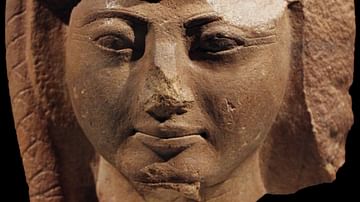Search
Search Results

Definition
The Graces
The Graces (also Charites, sing. Charis) were goddesses from Greek mythology who personified charm, grace, and beauty. Hesiod describes three Graces, and this is their most common grouping in literature and art, but their number varies depending...

Definition
Yama
Yama is the Hindu god of death, king of ancestors, and final judge on the destination of souls. He is also known as the 'Restrainer', Pretaraja or 'King of Ghosts', Dharmaraja or 'King of Justice', and as Daksinasapati is considered the regent...

Definition
Khaemweset
Khaemweset (also given as Khaemwaset, Khaemwise, Khaemuas, Setem Khaemwaset, c. 1281-c.1225 BCE) was the fourth son of Ramesses II (1279-1213 BCE) and his queen Isetnefret. He is the best known of Ramesses II's many children after the pharaoh...

Definition
Pawnee
The Pawnee are a Native American nation of the Plains Indians culture originally from the region of modern Nebraska. Prior to the European colonization of the Americas, they were among the most powerful of the Plains Indian tribes numbering...

Definition
Battle of Bosworth
At the Battle of Bosworth (aka Bosworth Field) in Leicestershire on 22 August 1485 CE, the Yorkist king Richard III of England (r. 1483-1485 CE) faced an invading army led by Henry Tudor, the figurehead of the Lancastrians. It was to be a...

Definition
Japanese War Tales
War tales (gunki monogatari) is a genre of historical writing that developed in Japan from the Heian Period (794-1185) to the Muromachi Period (1333-1573). They form an important element in the development of the Japanese literary tradition...

Definition
Bhubaneshwar
Bhubaneshwar (also spelt Bhubaneswar, Bhubanesar, and Bhuvanesvar) is a city located in the Orissa district of north-eastern India and flourished as a centre of Hindu worship from the 7th century CE. Its mass of well-preserved sandstone temples...

Book Review
The Ghosts of Cannae: Hannibal and the Darkest Hour of the Roman Republic
In history, famous battles define the generalship and reputation of military leaders, such as Gaugamela for Alexander the Great, Austerlitz for Napoleon, and the Battle of Cannae for Hannibal. Robert L. O’Connell’s book The Ghosts of Cannae...

Video
Anubis: Egyptian god of the Afterlife
Anubis, the Egyptian god of the afterlife and mummification. One of the important roles of Anubis was as the "Guardian of the Scales" in the Underworld when the hearts of dead souls were weighed as a determining factor whether the individual...

Video
The Qingming Festival: Chinese Tomb Sweeping Day
The Qingming Festival is held one hundred and four days after the winter solstice, and is known as the ‘pure bright festival’, ‘tomb-sweeping day’ and ‘ancestors day’. For over 2,500 years, this festival has been a day for Chinese people...